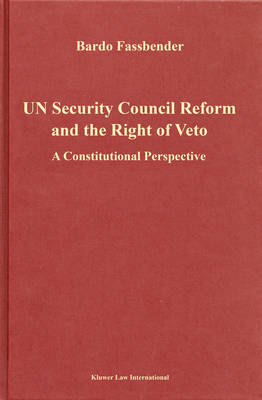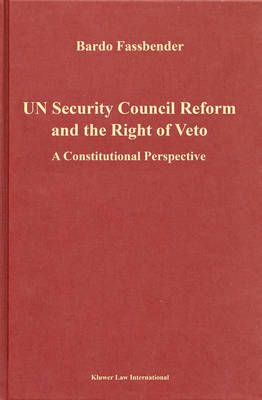
- Afhalen na 1 uur in een winkel met voorraad
- Gratis thuislevering in België vanaf € 30
- Ruim aanbod met 7 miljoen producten
- Afhalen na 1 uur in een winkel met voorraad
- Gratis thuislevering in België vanaf € 30
- Ruim aanbod met 7 miljoen producten
Zoeken
€ 383,45
+ 766 punten
Omschrijving
This book is a timely contribution to the present discussion of a constitutional reform of the United Nations, a discussion rekindled by the end of the cold War and the significant involvement of the UN in international peacemaking and peacekeeping since the Kuwait crisis. Like the new debate, the work focuses on the Security Council, its composition and possible enlargement, its decision-making process and competences, and its relationship with the General Assembly and the International Court of Justice. Particular regard is given to the right of veto of the permanent members of the Security Council, which is seen as the central, and most problematic, feature of the present constitution of the UN.
The work describes and analyzes the reform discussion as it has taken place at the UN since 1991. The different proposals made by governments, NGOs and individual scholars are evaluated by applying a number of standards and concepts ensuing from a perception of the UN Charter as constitution of the international community. Thus, the study advances a comprehensive constitutional theory of the UN and redefines the place of the Charter in contemporary international law.
The work describes and analyzes the reform discussion as it has taken place at the UN since 1991. The different proposals made by governments, NGOs and individual scholars are evaluated by applying a number of standards and concepts ensuing from a perception of the UN Charter as constitution of the international community. Thus, the study advances a comprehensive constitutional theory of the UN and redefines the place of the Charter in contemporary international law.
Specificaties
Betrokkenen
- Auteur(s):
- Uitgeverij:
Inhoud
- Aantal bladzijden:
- 436
- Taal:
- Engels
- Reeks:
- Reeksnummer:
- nr. 32
Eigenschappen
- Productcode (EAN):
- 9789041105929
- Verschijningsdatum:
- 1/04/1998
- Uitvoering:
- Hardcover
- Formaat:
- Genaaid
- Afmetingen:
- 168 mm x 247 mm
- Gewicht:
- 820 g

Alleen bij Standaard Boekhandel
+ 766 punten op je klantenkaart van Standaard Boekhandel
Beoordelingen
We publiceren alleen reviews die voldoen aan de voorwaarden voor reviews. Bekijk onze voorwaarden voor reviews.








